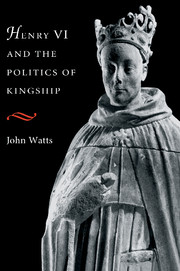Book contents
- Frontmatter
- Contents
- Preface
- List of abbreviations
- 1 Introduction: ideas and politics in fifteenth-century history
- 2 The conceptual framework
- 3 Government
- 4 Features of Henry VI's polity
- 5 The years of transition, 1435–1445
- 6 The rule of the court, 1445–1450
- 7 The search for authority, 1450–1461
- 8 Conclusion
- Bibliography
- Index
7 - The search for authority, 1450–1461
Published online by Cambridge University Press: 19 January 2010
- Frontmatter
- Contents
- Preface
- List of abbreviations
- 1 Introduction: ideas and politics in fifteenth-century history
- 2 The conceptual framework
- 3 Government
- 4 Features of Henry VI's polity
- 5 The years of transition, 1435–1445
- 6 The rule of the court, 1445–1450
- 7 The search for authority, 1450–1461
- 8 Conclusion
- Bibliography
- Index
Summary
In the summer of 1436, when the English stronghold at Calais was threatened by the duke of Burgundy, Henry VI's government wrote to various notables that it would ‘caste this lande oute of alle reputacion and in to perpetuelle reproche, vilonye and shame thorgh the world yf so fell – as with oure lordis mercy it never shall falle – that it were getyn by oure ennemys for lak of covenable defense in tyme’. Exactly this fate descended upon the king's ministers in 1449–50 and for much the same reasons. Turning too late to the widest public forum for aid, the remaining participants in Henry VI's regime had opened the way for the expression of massive public resentment. As we have seen, the resulting crisis drew the lords back to the centre in a last-ditch effort to preserve public authority. Having accepted the presentation of charges against Suffolk and agreed to his removal, they then stood together to resist any further attempts at criticism or reform. For many of Henry's other subjects, however, this was not enough. The duke's escape without trial simply lent support to the widespread idea that the king was surrounded by wicked men who used his power to keep themselves beyond the reach of justice. Popular anger exploded in the well-known wave of risings which swept across south-eastern England in the spring and summer of 1450 and went on unabated throughout the rest of the year. More disconcertingly still, from the point of the view of the government, it emerged that landowners were not unsympathetic to the views of popular critics: as Somerset was to discover in the autumn of 1450, the leitmotiv of Cade's rebels – judgement on the clique of traitors in the royal household – found support among the commons in parliament.
- Type
- Chapter
- Information
- Henry VI and the Politics of Kingship , pp. 260 - 362Publisher: Cambridge University PressPrint publication year: 1996



